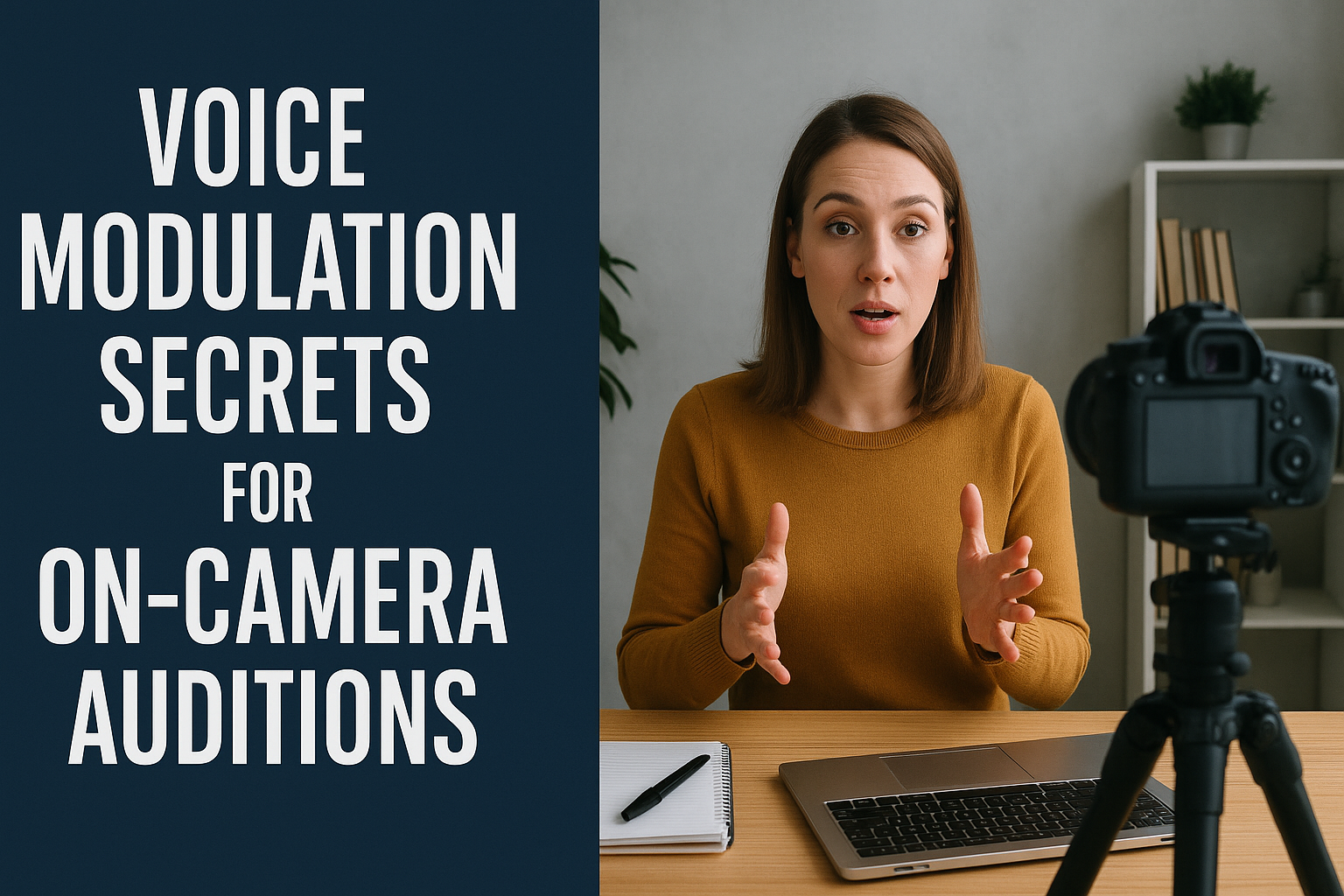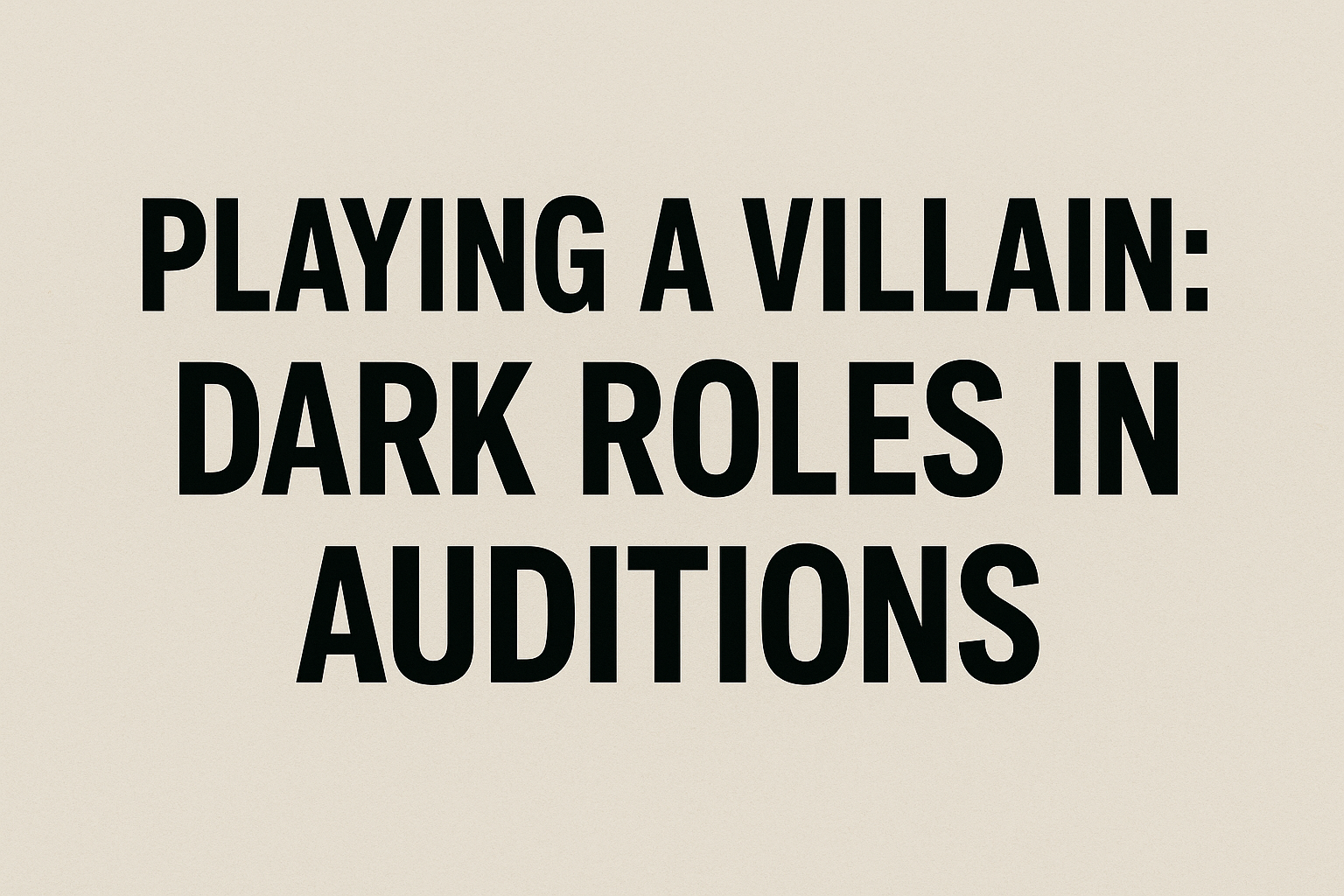
In on-camera auditions, your voice either makes or breaks you. It's not only what you're saying — it's how you say it. Voice modulation, or the skill of changing your pitch, tone, pace, and volume, brings emotion, credibility, and believability to your performance. A modulated voice invites the viewer into the performance and makes it unforgettable.
Regardless of whether you're auditioning for a commercial, film, web series, or voiceover, voice modulation is vital. In this blog, we're going to explore on-camera voice modulation tips that will help you be the star of your next on-camera audition.
Why Voice Modulation Matters in On-Camera Auditions
On screen, your body language and facial expressions are important — but your voice bears the emotional burden of the performance. A flat or monotonous voice can reduce the most interesting dialogue to nothing. A lively voice, on the other hand, can bring depth, nuance, and credibility.
Excellent voice modulation can:
Deliver a variety of emotions believably
Command the attention of casting directors
Make delivery appear spontaneous and natural
Assist in distinguishing between two or more characters or moods
Boost confidence and stage presence
Let's see how you can master this fundamental skill.
1. Know the Emotional Context
Only after knowing the emotional center of the scene will you be able to modulate your voice successfully. Ask yourself:
What is my character experiencing in this moment?
Is the tone serious, playful, sarcastic, intimate, fearful?
After you have defined the emotion, you can modify your vocal delivery accordingly. For instance:
Anger can need sharp tone and brisk pace.
Sadness can take slower tempo and softer volume.
Excitement can be conveyed with increased pitch and more breath energy.
Tip: Tape yourself reading the same line with changing emotional intentions. Listen to it back and observe how your voice naturally changes.
2. Vary Your Pitch and Tone
Pitch means the highness or lowness of your voice. Varying your pitch brings color and interest to speaking. Monotone speaking is a trap people often fall into, particularly in stressful situations.
How to vary pitch:
Highlight important words by raising or lowering your pitch ever so slightly.
Try "pitch ladders" — repeat a sentence a few times, changing the pitch each time to discover what sounds most expressive.
Avoid sing-song or unnatural intonation — go for reality.
Tone, however, conveys attitude. The very same line may sound sincere, sarcastic, perplexed, or flirtatious depending on your tone. Don't be timid to try new things within your rehearsals.
3. Control Your Pace
Pace is the rate at which you speak. It's a strong means of emphasis and emotion.
Slow down on key lines to allow the words to sink in.
Increase speed at times of tension or excitement.
Employ strategic pauses to create suspense, indicate thought, or allow time for the listener to take it in.
Watch for nervous habits — many actors rush at times of nervousness. Practice using a timer or a metronome to develop a natural cadence.
4. Master Volume Control
Volume isn't merely about being loud or soft — it's about conscious choices. On camera, subtlety tends to prevail. You don't have to project the way you would on stage.
Employ softer volume for vulnerable or intimate moments.
Stretch your volume a bit for emphasis or high-tension moments — but only within the natural range of the camera and mic.
Yell only when the scene absolutely demands it, and even then, vary the level of intensity.
Keep in mind that microphones capture it all — so practice sounding "small" vocally when appropriate.
5. Warm Up Your Voice
You are working with an instrument — your voice. Just as a dancer warms up his or her body, you have to warm up your voice prior to auditions.
Practice these vocal warm-ups:
Lip trills and tongue trills to loosen the vocal cords
Humming to resonate your voice softly
Breathing exercises to build support and control
Articulation exercises such as "red leather, yellow leather" to refine diction
A few minutes of warm-up can enhance your clarity and vocal dexterity.
6. Breathe from the Diaphragm
Correct breathing is the basis of voice modulation. Shallow chest breathing restricts your vocal power and control.
Practice diaphragmatic breathing by putting a hand on your stomach and feeling it rise when you inhale.
Breathe deeply and quietly through the nose, exhale with control.
Use your breath to sustain long sentences and control volume.
A guided breath allows you to be in command of pace, pitch, and volume.
7. Tape and Listen Back Your Auditions
One of the most effective voice modulation exercises is to be able to listen objectively to your own sound. Tape your auditions and listen back with a critical ear.
Ask yourself:
Did I modulate my pitch, pace, and volume sufficiently?
Did my tone convey the right emotion for the scene?
Were there ever times that seemed flat or forced?
With practice, this becomes a self-directed skill that makes you more aware and builds vocal intuition that sounds honest and expressive.
8. Take Acting or Voice Coaching
Having a coach can give your voice modulation a speed boost. They can provide specific feedback and assist with moving away from negative habits.
Find coaches who are experts in:
On-camera acting
Voiceover performance
Dialect and speech work
Public speaking
Even a few sessions can transform your vocal delivery.
Voice modulation is more than a technique — it’s a bridge between the written script and human emotion. The camera captures everything, and your voice must be just as expressive as your eyes or body.
Don't overlook the influence of your voice in leaving a lasting impression. With regular practice and attention, you can make your lines come to life in a way that appears spontaneous, real, and engaging.
So next time you prepare for an on-camera audition, keep in mind: it's not what you say — it's how you say it.
Acting may be an art, but in the world of professional performance, it begins long before the cameras roll or the stage lights shine. It begins with the audition — the often nerve-wracking, unpredictable process that determines whether an actor even gets the chance to perform. For aspiring actors, understanding the relationship between auditioning and acting is not just important — it's essential. One feeds into the other, and together, they shape an actor’s growth, resilience, and ultimate success.
When it comes to acting, playing a villain is considered a challenge and a golden chance. Villains are multilayered, multi-dimensional, and probably the most remembered characters in a narrative. Be it old Bollywood films such as Gabbar Singh from Sholay or OTT villains such as Guruji from Sacred Games, dark roles determine an actor's fate. But auditioning for a villain is an altogether different. It needs a firm grasp of psychology, body language, and emotional regulation. If you're a newbie or a seasoned actor wanting to master your craft, this blog will walk you through all that you need to know on how to audition for villainous roles.
In the high-stakes, emotionally demanding world of acting, rejection is frequent, uncertainty is constant, and comparison can feel unavoidable. The entertainment industry is as competitive as it gets—and in such an environment, your mindset can make or break your journey. While talent, networking, and luck all play their part, there's one internal tool that can drastically shift your trajectory: a growth mindset.
There is a moment every actor fears: the casting director places a script in your hands you've never laid eyes on before and says, "Take a minute, and when you're ready, we'll begin. Welcome to the cold read — perhaps the most unpredictable, yet vital portion of an actor's career. Whether you're auditioning for theater, television, or voiceover, cold reading is the skill that can break or make your chance at a role. But the good news is this: like every other craft, it can be practiced, honed, and eventually mastered. In this post, we will analyze what cold reading actually is, why it's important, and how you can transform a cold script into a warm, breathing performance.
Lights Camera Audition!
Don't miss out on the latest updates, audition calls, and exclusive tips to elevate your talent. Subscribe to our newsletter and stay inspired on your journey to success!







